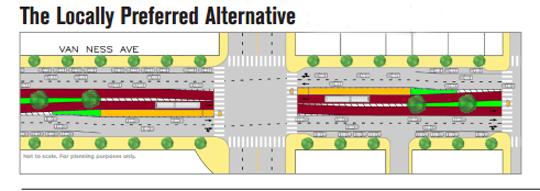San Francisco today inched closer to finally creating a modern bus rapid transit system on Van Ness Avenue, nine years after it was officially proposed, although as we reported in last week’s paper, the city is still about five years away from actually completing it.
The San Francisco Municipal Transportation Agency Board of Directors today approved the project’s Environmental Impact Report, following up its approval last week by the San Francisco Transportation Authority, which has the same makeup as the Board of Supervisors.
Next, the $126 million project heads to the Federal Transportation Authority for approval of its environmental documents, after which it heads into a design phase and comes back for its project-level approvals, giving its motorist critics plenty of time to make mischief and undermine it.
In last week’s debut Street Fight column, Jason Henderson made equity arguments about how a project that will speed up Muni for tens of thousands of riders, and that it’s moving forward over the objections to losing 105 parking spaces, sparking an explosion of caustic comments.
In prepared comments about today’s vote, SFMTA head Ed Reiskin said, “The Van Ness BRT project will transform Van Ness for Muni drivers and for pedestrians, making travel a much more pleasant, safe, and efficient experience.” In his column, Henderson also added the descriptor “dignified,” which should be another goal on an underfunded system that is now busting at its seams.
As much as motorists love to complain about government, or the “bike lobby,” or other perceived enemies of their convenience, San Francisco should be doing more to create pleasant, safe, efficient, and dignified service to the growing population that relies on Muni.
That will mean some more sacrifices by motorists, it will mean finally asking businesses to help pay for Muni improvements with a downtown transit assessment district (instead of moving in the opposite direction by expanding corporate welfare giveaways), and it will mean finally getting serious about improving the system, rapidly, rather than the nearly 15 years it is taking for this common sense improvement.

